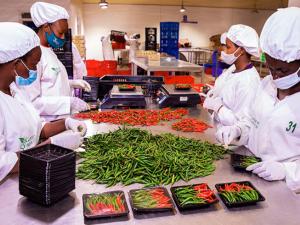
How can Rwanda achieve its $1bn target in agric exports?
Rwanda has a target to generate $1 billion (Rwf1 trillion) in annual agricultural exports by 2024, which is more than double the current output by the sector. However, the path to achieve this is not as smooth, at least considering the prevailing circumstancesIndeed, Rwanda’s agricultural exports amounted to over $419.1 million (about Rwf406 billion) in 2019/2020 down from $465.4 million recorded in 2018/2019, representing a decrease of 10 per cent, according to data from the National Agricultural Export Development Board (NAEB).
It is to note that the country’s agricultural export earnings had dropped by 9.7 per cent from $515.9 million in 2017/2018 to $465 million in 2018/2019.
The reduction in terms of revenues in 2019/2020 was attributed to the disruptions of informal cross border trade due to movement restrictions linked to the Covid-19 pandemic.
This was disclosed by NAEB in its June 2020 report containing statistical data comparing the performance in 2019/2020 and that in 2018/2019.
As a result of the pandemic, NAEB said, all informal cross border trade were converted into simplified formal trade where only less than 20 per cent of traders managed to combine their goods to be sold in bulk to Democratic Republic of Congo (DRC) – the major regional market for Rwanda’s agricultural produce.
However, it said, commodities like tea, oil for cooking and sugar were not affected by Covid-19 as they realised an increase in export revenues of 20.98 per cent; 27.9 per cent and 14.81 per cent respectively.
Apart from reduction in volumes of exported commodities, low prices at the international and regional markets were also among the factors that drove down the revenues.
For instance, the country’s coffee exports generated over $60.4 million in 2019/2020, a decrease of about 12 per cent compared to $68.7 million in 2018/2019.
That decline was a result of coffee export volume that reduced by 9 per cent to over 19.7 million kilogrammes in 2019/2020 from over 21.6 million kilogrammes in 2018/2019, and a 3.7 per cent decrease in average coffee price from $3.18 a kilogramme in 2018/2019 to $3.06 in 2019/2020.
This article focuses on what it will take for Rwanda’s agricultural exports to be able to fetch $1 billion.
Diversifying agricultural exports
According to the Strategic Plan for Agriculture Transformation (PSTA 4) 2018-2024,export diversification beyond traditional coffee and tea is essential for improving resilience against international commodity price shocks, underscoring the need to promote non-traditional export crops such as horticulture and animal products.
Reaching $1 billion in annual exports revenue by 2024 will require doubling down on exports of emerging crops such as cereals and horticulture, as well as meat, dairy and poultry products, while steadily growing traditional exports crops which are coffee, tea and pyrethrum, according to NAEB’s strategic plan 2019-2024, published in May 2019.
International exports growth will be led respectively by exponential growth in horticulture high-value fresh products (French beans, snow peas, passion fruits, chilies, and cut flowers) mainly towards the European market, followed by the Middle East, and the rest of Africa.
The strategy indicated that there is also need for continued growth in tea as Rwanda increases its global market share and diversifies into specialty tea, therefore capturing higher value; and steady growth in coffee exports value by increasing sales of specialty coffee.
Also, it cited the rise in pyrethrum exports volumes and value by increasing productivity and diversifying into value addition.
Expanding market base
NAEB Communication Specialist, Pie Ntwari told The New Times that to overcome the observed challenges, NAEB is putting more effort in drivers including investing much effort in terms of [commodity] promotion and attracting high end market that fetches the premium prices.
“NAEB will be working on market linkage with big buyers through forward contracts to ensure sustainable and well-paying markets (direct sales),” he said.
He said that NAEB has also started attracting big investors with global market shares to ensure the competitiveness of Rwandan agri-products through their presence, such as Unilever, LAXMI and Wood Foundation.
Apart from diversification of agri-exports and value addition, he said, it has opted to use trading platform for different commodities (coffee, tea, horticulture) with focus on e-commerce).
More investment, value addition
Robert Rukundo, Chairman of Horticulture Exporters Association of Rwanda told The New Times that investing in improving transport logistics and value addition, as well as tapping into the opportunities presented by the African Continental Free Trade Area (AfCFTA), are some of the factors that the Government should consider going forward.
“Horticulture export business heavily depends on transport cost. If airfreight charges are high, it is unfavourable to the profits of exporters and the entire horticulture sector at large as the produce from farmers will not be sold adequately,” he said.
“And, we cannot continue to rely heavily on exporting fresh produce if we want to gain more from agricultural exports. Value addition is critical in order to get higher returns,” he said adding that it helps to make long-shelf life products that do not get damaged easily as fresh produce.
Canisius Bihira, an economist in project management told The New Times that the Covid-19 pandemic has been one of the challenges to agricultural export growth as of recent, and it threatens to hinder the realisation of the set target.
Also, he said, the Government should prioritise funding for agriculture by increasing the allocation to the sector from less than 10 per cent of its budget currently to 20 per cent. The move, he said, can help farmers afford technologies that can increase productivity.
He said inadequate efforts to produce raw materials in the country result in some agro-processing factories in Rwanda rely on importing raw materials, citing those that produce apple juice, because the fruit is not grown in the country.
“When we get increased farm yields, we can add value to the produce through developing agro-processing. By so doing, the country will earn more from exporting value-added products than raw produce,” he said.
